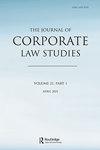The social enterprise company in Europe: policy and theory
IF 1.5
4区 社会学
Q1 LAW
引用次数: 4
Abstract
ABSTRACT Corporate organisational constructs facilitating social enterprise have proliferated for the last decade across Europe. This article investigates this phenomenon, and provides an initial analytical framework through which the social enterprise company can be understood, both on its own terms and with respect to the traditional business organisation. The article begins by laying out policymakers' collective intentions for creating the social enterprise company. The discussion then turns to theorising the social enterprise company's organisational architecture. The social enterprise company is a hybrid organisational construct designed to generate social value. For this reason it operates according to the principle of publicness. The intention was also for the social enterprise company to be resource flexible and attract altruistic investors and managers. The article then further extends the theoretical discussion by mapping early stage and later stage investor involvement with reference to the current state of the impact investment landscape, and investigates how these considerations relate to the jurisdictions' isomorphic prevention mechanisms, which encourage impact fidelity in the context of a conversion or a winding up.欧洲社会企业:政策与理论
在过去的十年里,促进社会企业发展的企业组织结构在欧洲各地激增。本文调查了这一现象,并提供了一个初步的分析框架,通过这个框架,社会企业公司可以被理解,无论是在其自身的条件下,还是在传统商业组织方面。本文首先阐述了政策制定者创建社会企业公司的集体意图。然后,讨论转向理论化社会企业公司的组织架构。社会企业公司是一种混合型组织结构,旨在创造社会价值。因此,它按照公共性的原则运作。其目的还在于使社会企业公司具有资源灵活性,并吸引无私的投资者和管理者。然后,本文进一步扩展了理论讨论,通过参考影响投资环境的现状,绘制早期和后期投资者参与的地图,并调查了这些考虑与司法管辖区的同构预防机制之间的关系,这些机制在转换或清盘的背景下鼓励影响保真度。
本文章由计算机程序翻译,如有差异,请以英文原文为准。
求助全文
约1分钟内获得全文
求助全文

 求助内容:
求助内容: 应助结果提醒方式:
应助结果提醒方式:


